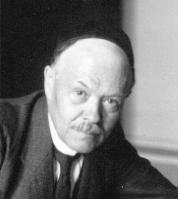Charles Nicolle
|
|
Dr. Charles Jules Henry Nicolle (September 21, 1866 - February 28, 1936) was a bacteriologist who earned the 1928 Nobel Prize in Medicine for his identification of lice as the transmitter of epidemic typhus.
| Contents [hide] |
Biography
Born in Rouen, France, Charles learned about biology early from his father Eugène Nicolle, a doctor at a Rouen hospital. He received his M.D. in 1893 from the Pasteur Institute. At this point he returned to Rouen, as a member of the Medical Faculty until 1896 and then as Director of the Bacteriological Laboratory.
In 1903 Nicolle became Director of the Pasteur Institute, where he did his Nobel Prize-winning work on typhus. He was still director of the Institute when he died in 1936.
He also wrote fiction and philosophy through his life, including the books Le Pâtissier de Bellone, Les deux Larrons, and Les Contes de Marmouse.
He married Alice Avice in 1895, and had two children, Marcelle Nicolle (b. 1896) and Pierre Nicolle (b. 1898).
Accomplishments
Dr. Nicolle's most major accomplishments in bacteriology were:
- His discovery of the transmission method of typhus fever
- His introduction of a vaccination for Malta fever
- His discovery of the transmission method of tick fever
- His studies of cancer, scarlet fever, rinderpest, measles, influenza, tuberculosis and trachoma.
During his life Nicolle wrote a number of non-fiction and bacteriology books, including Le Destin des Maladies infectieuses; La Nature, conception et morale biologiques; Responsabilités de la Médecine, and La Destinée humaine.
Charles_Nicole_-_Microscope.jpg
Charles Nicole
Discovery of the Vector
Dr. Nicolle's discovery came about first from his observation that, while epidemic typhus patients were able to infect other patients inside and outside the hospital, and their very clothes seemed to spread the disease, they were no longer infectious when they had had a hot bath and a change of clothes. Once he realized this, he reasoned that it was most likely lice that were the vector for epidemic typhus.
In June 1909 Nicolle tested his theory by infecting a chimpanzee with typhus, retrieving the lice from it, and placed it on a healthy chimpanzee. Within 10 days the second chimpanzee had typhus as well. After repeating his experiment he was sure of it: lice was the carrier.
Further research showed that the major transmission method was not louse bites but excrement: lice infected with typhus turn red and die after a couple of weeks, but in the meantime they excrete a large amount of microbes containing the virus. When a small quantity of this is rubbed on the skin or eye, an infection occurs.
Attempt at a Vaccine
Dr. Nicolle surmised that he could make a simple vaccine by crushing up the lice and mixing it with blood serum from recovered patients. He first tried this vaccine on himself, and when he stayed healthy he tried it on a few children (because of their better immune systems), who developed typhus but recovered.
He did not succeed in his effort to develop a practical vaccine. The next step would be taken by Rudolf Weigl in 1930.
References
- Nobel Lectures, Physiology or Medicine 1922-1941 (http://www.nobel.se/medicine/laureates/1928/nicolle-bio.html) - Nobel Biography of Dr. Charles Nicolle
- How Charles Nicolle of the Pasteur Institute discovered that epidemic typhus is transmitted by lice: reminiscences from my years at the Pasteur Institute in Paris (http://www.pnas.org/cgi/reprint/93/20/10539.pdf) by Ludwik Gross, August 6, 1996bg:Шарл Никол
fr:Charles Jules Henri Nicolle es:Charles Nicolle pl:Charles Nicolle

